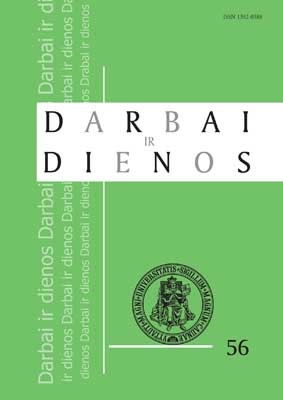Dar apie Kostą Korsaką
More about Kostas Korsakas
Author(s): Audrius RačkauskasSubject(s): Cultural Essay, Political Essay, Societal Essay
Published by: Vytauto Didžiojo Universitetas
Keywords: Kostas Korsakas; communism; party; partija; komjaunimas
Summary/Abstract: Šio straipsnio tikslas − išsamiau nušviesti Kosto Korsako sąlytį su Lietuvos komjaunimu ir Lietuvos komunistų partija – (toliau − LKP) 1927−1935/36 metais. Pirmoji data žymi pradžią, o antroji − taktikos kairiosios inteligentijos atžvilgiu kaitą. K. Korsako veiklą šiuo aspektu tyrinėjo Mindaugas Tamošaitis. Jis neišsėmė temos – pasitelkus nepanaudotus šaltinius, galima sukonstruoti kiek kitokį rekonstrukcinio pobūdžio pasakojimą. Pagrindinis šio straipsnio skirtumas nuo M. Tamošaičio tas, kad išryškinama priešiška (o ne prieštaringa, kaip norėtų M. Tamošaitis) LKP pozicija K. Korsako atžvilgiu nuo 1929 iki 1936 m. ir atskleidžiamos šio priešiškumo priežastys. Šiuo klausimu „prakalbinamas“ ir pats K. Korsakas. It is the purpose of this essay to provide a reconstructive account of Kostas Korasakas‘s relationship with the Communist Party from 1927 to 1935/36. He had ties to the Communist Youth League even as a high school student in 1927 and 1928. After his arrest in 1928, while sitting in prison he could not firmly make up his mind about joining in Communist activities. An affirmative decision would have entailed a prohibition from participating in public Lithuanian literary life. In the fall of 1929 Korsakas made the decision to stay away from Communist activities; this caused him to fall out of the Lithuanian Communist Party‘s favor. In 1930 and 1931 he was the person mainly responsible for articulating the ideology of the journal Trečias frontas (Third Front). As a literary critic, he was influenced almost exclusively by Russian Marxist literary scholars; therefore, their ideas indirectly dominated in that journal‘s pages. When in the spring of 1931 the editorial board of Trečias frontas decided to enter into closer ties with the Communist Party, Korsakas became one of the obstacles because the party did not want to have anything to do with groups that harbored “renegades” within their ranks. Hence in October 1931 he was formally removed from the editorial board. But in fact he continued to participate in the journal‘s activities for the next serveral months until it folded. A year later Korsakas decided to present his own interpretation of why Trečias frontas collapsed. According to him, the main reason lay in the allegedly too dogmatic attitude that Lithuanian Communist leaders had towards some members of the Trečias frontas collective who were sympathetic to the Communist movement, as a result of which attitude they felt psychologically and creatively discouraged. Sill, throughout this period Korsakas remained a sympathizer of the Soviet Union and distinguished between the policies of the Lithuanian Communist Party and of the Communist Party of the Soviet Union.
Journal: Darbai ir dienos
- Issue Year: 2011
- Issue No: 56
- Page Range: 207-226
- Page Count: 20
- Language: Lithuanian

